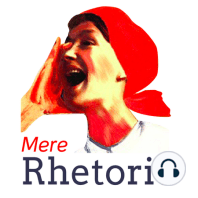12 min listen
Clark Rhetorical Landscapes (NEW AND IMPROVED!
FromMere Rhetoric
ratings:
Length:
9 minutes
Released:
May 18, 2016
Format:
Podcast episode
Description
Rhetorical Landscapes in America: Variations on a Theme from Kenneth Burke by Gregory Clark
Welcome to Mere rhetoric, the podcast for beginners and insiders about the ideas, terms and movements that shaped rhetorical history. I’m Mary Hedengren and if you’ve like to get in touch with me you can email me at mererhetroicpodcast @gmail.com or tweet out atmererhetoricked.
Today on Mere Rhetoric I have the weird experience of doing an episode on someone who isn’t just living, but someone who was my mentor. If you’ve ever had to do a book report on a book your teacher wrote, you understand the feeling. But I really do admire the work of Gregory Clark, especially his seminal work in Burkean Americana. Clark is was been the editor of the Rhetoric Society Quarterly for eight years and recently became the President Elect of the Rhetoric Society in America, which means, among other things, he’s responsible for the RSA conference, like the one I podcasted about earlier this summer. He also wrote a fantastic book called Rhetorical Landscapes inAmerica, that became the foundation for a lot of work that looks that the rhetoricality of things like museums, landscapes and even people.
In the final chapter of Gregory Clark’s Rhetorical Landscapes in America: Variations on a Theme from Kenneth Burke, he poses the question “where are we now?” (147). We’ve certainly been many wonderful places. In Rhetorical Landscapes, Clark has packed up Kenneth Burke’s identification theory of rhetoric and applied it to the national landscapes of America. Clark suggests that our identity as Americans comes, largely, from our experiences with common landmarks. To demonstrate this power of Burke’s concept of identification, Clark has taken us through more than a century of American tourism, from New York City in the early 19th century to Shaker Country to the Lincoln Memorial Highway. We’ve been convinced by Clark of the rhetorical power of these places to create a national identity. We’ve seen how mountains and parks and even people can evoke a feeling of identification. It’s been a long, lovely ramble by the time we get to Clark’s question. Reading his words, one can’t escape the image of a wanderer who, having ambled through one delightful landscape after another finds himself suddenly disoriented as to his current location. Clark himself describes his project as “a ramble” and it is this apt description that encapsulates both the dizzying strengths of the book (147).
Surely one of the most striking strengths of this ramble is the remarkable company we keep. Clark has brought the human and extremely likable specter of Kenneth Burke along for this meander through American tourism. The Burke of this book has not only provided us with the language of identification in our community of travelers to “change the identities that act and interact with common purpose;” he’s consented to come along with us (3). Clark presents Burke as one who was “himself a persistent tourist in America” (5). Burke very charmingly has written about his traveling “’go go going West, the wife and I/.../ “Go West, elderly couple”’” (qtd. Clark 7). When Burke’s theories of national identification are presented to us chapter-by-chapter, we enjoy their application in the presence of a critic who is not cynically immune to the process of identification, only acutely aware of it. Presented as accessibly and understandable, Clark has written us a Burke we can road trip with.
If Clark has presented for us a clear, insightful and accessible version of Burke through this rambleit is because of his own remarkable prowess as a teacher. He is willing to let Burke be a fellow-traveler with us and he is willing, himself, to join us personally in the ramble. We readers are fortunate to have Clark with us, just as much as we are to have his clear explanations of what Burke would say if the deceased were alongside us. Just as Burke is not immune to the seduction of American tourism, Clark gives us am
Released:
May 18, 2016
Format:
Podcast episode
Titles in the series (99)
Ekphrasis (NEW AND IMPROVED: Ekphrasis Welcome to Mere Rhetoric, a podcast for beginners and insiders about the ideas, people and movements who have shaped rhetorical history. I’m Mary Hedengren and, ah, here I am in my newly redecorated research cube. I’ve taped... by Mere Rhetoric
